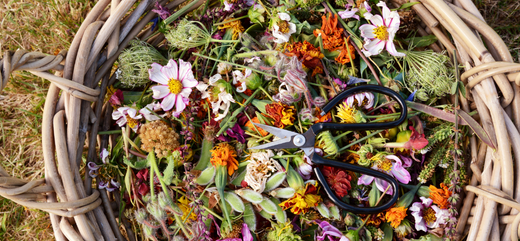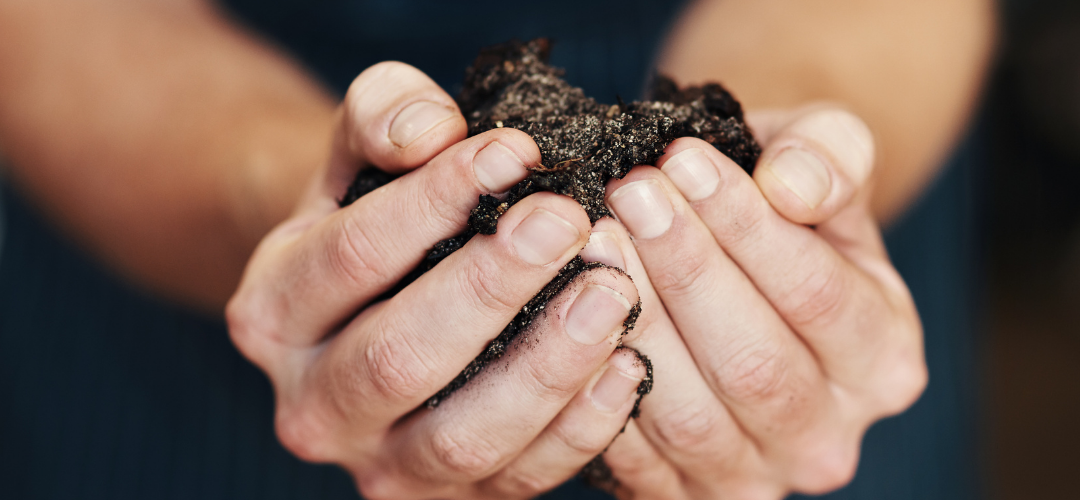How to use microbes in your autumn and winter garden
Nature is all about cycles—the tides, seasons, even the soil’s health—and with summer’s warmth behind us, autumn and winter become ideal times to replenish and prepare your garden. As you settle into the slower pace of cooler months, it’s an excellent opportunity to focus on strengthening your soil with beneficial microbes that nurture plant health, enhance soil vitality, and foster a balanced garden ecosystem.
Late autumn and winter are great times for harvest, cleanup, and preparation. Here are some top tasks to keep your garden thriving during these colder months:
1. Cutting back plants and deadheading:
Trimming back perennials and deadheading late-blooming flowers helps tidy your garden, prevents disease, and redirects nutrients back to the roots for winter storage. Leaving some dead plants or seed heads, however, can provide a winter food source for birds and beneficial insects, so a balanced approach is what we’re going for.
2. Adding mulch to ‘put soil to bed’
A winter mulch layer helps insulate soil, conserves moisture, and provides shelter for microbes and small organisms. Mulching with organic materials—such as straw, leaves, or compost—protects soil from frost and erosion while breaking down over time, adding nutrients back into the ground.
This is where microbial soil conditioners, like microbz soil conditioner, come in handy. When applied under a layer of mulch, it helps beneficial bacteria colonize, enrich soil structure, and bolster its water-retention capabilities.
3. Planting spring bulbs
Planting bulbs like tulips, daffodils, and crocuses in late autumn ensures vibrant color in early spring. These bulbs need a period of cold to stimulate root growth, making autumn an ideal time to plant them. Hurry though, up to the end of November is best for planting spring bulbs especially tulips. A microbe-rich soil bed gives them a stronger foundation for growth and helps retain necessary nutrients so you can add in soil conditioner or plant boost when you’re planting.
4. Protecting water features
Cover ponds and water features to catch falling leaves and keep them clear for winter. This prevents decay and keeps the water cleaner for any aquatic life, minimizing the chance of algae buildup and improving overall water quality. During winter’s damp periods, beneficial bacteria can help keep water features fresh without relying on chemicals. Make sure you add in our pond balance just before you cover it to support the beneficial bacteria in your pond.
5. Turning over soil and adding compost
Late autumn and early winter are great times to turn over soil in vegetable plots, mixing in compost or organic material. For no-dig gardeners, adding a microbial compost activator to the top layer encourages the decomposition of any remaining plant material, enhancing microbial diversity and soil fertility over the winter.

Microbes for winter resilience
Microbes are the foundation of a healthy garden ecosystem, even in winter. They continue to work below the soil, breaking down organic material, enhancing nutrient availability, and strengthening plants against environmental stressors.
Microbe-rich soil helps in several ways:
- Supports water retention and temperature regulation: microbes improve the soil's structure, allowing it to retain moisture and insulate plant roots against cold temperatures.
- Protects roots from frost damage: a healthy microbial ecosystem in the soil can boost plants’ resilience to frost and fluctuating temperatures.
- Builds soil nutrients: microbes break down organic material, enriching soil nutrient content naturally, setting up a nutrient-dense foundation for spring growth.
Respiratory health in the winter garden
Working in a microbe-rich garden isn’t only good for the plants; it’s beneficial for us too. Gardening outdoors during cooler months helps reduce stress, exposes us to fresh air, and maintains physical activity.
The soil’s diverse microbial communities can also improve respiratory health by filtering pollutants and balancing the air’s microbial content. A healthy garden environment benefits the lungs and immune system, providing a wellness boost even in winter.
Microbz products for your autumn and winter garden
The microbz range offers natural microbial solutions that nourish soil throughout the colder months, helping it retain moisture, absorb nutrients, and create a thriving microbial ecosystem.
Here are some ideal uses:
Soil conditioner:
Spray directly on bare soil to boost microbial diversity and retain winter moisture.

Compost activator:
Perfect for no-dig gardening, it encourages decomposition of autumn plant debris and strengthens the soil’s structure over the winter.

Winter mulch addition:
Use soil conditioner or compost activator beneath mulch to help microbial colonies establish under the protective layer, enriching the soil for spring.
As Dave Goulson notes in The Garden Jungle, mindful gardening can transform our gardens into thriving mini-nature reserves that promote biodiversity and benefit the planet.
With a few small changes, you can create a winter sanctuary that benefits both your garden and the environment.
By embracing these winter practices, you’re not only setting your garden up for spring success but also contributing to a healthier, more balanced ecosystem. Enjoy the change of seasons, and let microbes do their work to help your garden flourish!
What to plant during autumn and winter
As the days grow shorter and the temperature drops, your garden doesn't have to fall dormant. Autumn and winter are perfect seasons to focus on hardy plants and vegetables that thrive in cooler weather. Whether you're looking to brighten up your outdoor space or prepare for a fruitful spring, there are plenty of planting options to explore.
Vegetables to sow and grow
Autumn is an excellent time to sow cold-resistant crops that can handle frost and even snow. Vegetables such as kale, spinach, and winter lettuce are hardy and will provide fresh greens throughout the colder months. Garlic and onions are also great choices for autumn planting, as they require a cold period to develop into full bulbs. Simply plant the cloves or sets in well-drained soil and let nature take its course over the winter.
For a quicker payoff, consider sowing radishes or rocket in early autumn. These fast-growing crops will be ready to harvest before the first hard frosts arrive. If you have space for a greenhouse or cold frame, you can extend your growing season for even more options like carrots or beetroot.
Make sure you get your seeds from somewhere like vital seeds or organic gardener.
Flowers and foliage for a winter wonderland
Don't underestimate the power of winter flowers to add life and color to your garden. Hardy plants like pansies, violas, and cyclamen can provide vibrant blooms that brighten even the gloomiest days.
These plants thrive in cooler temperatures and can be planted in borders, pots, or hanging baskets.
If you're looking for something evergreen, heather and winter-flowering hellebores (often called Christmas roses) are stunning choices. For a more structural look, ornamental cabbages and grasses add texture and charm, even when the frost sets in.
Caring for wildlife
As the temperature drops, our garden wildlife needs a little extra help to get through the colder months. Supporting birds, hedgehogs, insects, and other animals can be as simple as providing food, shelter, and a welcoming habitat.

Feeding birds
Winter can be tough on birds as natural food sources become scarce. Set up bird feeders stocked with high-energy foods like sunflower seeds, fat balls, and mealworms to help them maintain their strength. Remember to clean feeders regularly to prevent the spread of disease. A shallow bowl of fresh water is also essential, especially during freezing conditions, to ensure they have access to hydration.
Helping hedgehogs and small mammals
Hedgehogs often rely on gardens to hibernate, so leaving a pile of logs or leaves in a quiet corner can provide them with a safe and cozy spot to rest. If you're lucky enough to spot a hedgehog active during the winter, consider leaving out meaty cat or dog food (not milk or bread) to supplement their diet as they prepare for hibernation. Avoid tidying your garden too much; fallen leaves and natural debris create invaluable habitats for small mammals and insects.
Supporting insects and pollinators
Even insects play a critical role in the garden's ecosystem during winter. Build an insect hotel using hollow stems, bamboo canes, or small logs to give solitary bees, ladybirds, and other insects a safe haven. Planting late-flowering plants like ivy can provide vital nectar for pollinators as they prepare for the colder months.
By taking a few simple steps, you can transform your garden into a sanctuary for wildlife, ensuring the creatures who call it home survive and thrive through the winter. In return, they'll help keep your garden healthy and balanced when spring arrives.




